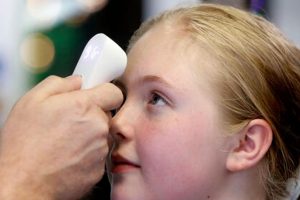Hospitals may be overcounting how many kids are admitted for COVID-19 in the US, study finds

A new study found health care providers may be overcounting the number of kids hospitalized for COVID-19, overestimating the small impact the disease has on children.
Researchers at the Stanford University School of Medicine analyzed COVID-19 data from Lucile Packard Children’s Hospital Stanford from May 10, 2020, to Feb. 10. During the nine-month period, 117 patients under the age of 18 either tested positive for SARS-CoV-2 at the hospital or were hospitalized for multisystem inflammatory syndrome in children, or MIS-C.
Out of the 117 children, nearly 40% of COVID-19 cases were asymptomatic, according to the study published Wednesday in the peer-reviewed journal Hospital Pediatrics. About 45% of those hospital admissions were categorized as unlikely to be caused by the virus.
“It’s in keeping with what other studies have shown, which is that children in general are relatively mildly affected by the infection,” said Dr. Asim Ahmed, a pediatric infectious disease specialist unaffiliated with the study and senior medical director at Karius, an infectious disease diagnostic company.
Dr. Alan Schroeder, study co-author and clinical professor of pediatric critical care and pediatric hospital medicine at Stanford, said it’s important to distinguish between children who test positive but are asymptomatic and those who are hospitalized for COVID-19 to understand how the disease truly affects the pediatric population.
“Our goal is to make sure we have accurate data on how sick children are getting,” he said. “If we rely on hospitals’ positive SARS-CoV-2 test results, we are inflating by about twofold the actual risk of hospitalization from the disease in kids.”
The study found about 28% had mild to moderate COVID-19, 7.7% had severe illness, 12.8% had critical illness and 12% of patients had MIS-C, a serious condition that appears to be connected to COVID-19 in which some organs and tissues can become severely inflamed.
Study authors said it’s likely many children develop other conditions that require hospitalization, then test positive for SARS-CoV-2 without knowing they were infected. Though this data may be useful to better understand community transmission, it doesn’t accurately measure the rate at which kids get sick with COVID-19, said Dr. Roshni Mathew, lead author and clinical associate professor of pediatric infectious diseases at Stanford.
In rural America: COVID-19 vaccination rates lag urban areas as access, hesitancy remain barriers
‘Get the word out’: New USPSTF guidelines lower age to begin colorectal cancer screening from 50 to 45
“Just knowing that a child is hospitalized and has the virus is not enough information to determine if they are actually sick with COVID-19,” she said.
Researchers said some of the study’s limitations may have affected its results. For example, the study sample size is relativelysmall compared with other regions of the country where COVID-19 may have been more prevalent.
Data may be skewed by the unusually low hospitalization rates at pediatric centers, Ahmed said. Those were partly due to parents’ reluctance to take their kids to a hospital for fear they could get sick and the low prevalence of illnesses, such as the flu, after public health measures were implemented to control the pandemic.
The U.S. is expanding use of Pfizer's COVID-19 vaccine to children as young as 12. The Food and Drug Administration says the shot is safe and offers strong protection for younger teens based on testing of more than 2,000 U.S. volunteer. (May 3)
AP Domestic
“Even though the hospitalization patterns and practices were a certain way for the adult hospitals (during the pandemic), they were very different for the pediatric hospitals,” he said. “The census across the board for pediatric hospitals was quite low.”
Severe disease is rare among children with COVID-19, but health experts still urge parents to get their kids vaccinated as severe disease, hospitalizations and deaths do occur.
About 300 children have died from COVID-19 in the USA, said Dr. John Williams, chief of the division of pediatric infectious diseases at UPMC Children’s Hospital of Pittsburgh.
He said getting children vaccinated is important to prevent coronavirus transmission and protect people who are immunocompromised and may not respond as robustly to the COVID-19 vaccines.
“It’s an important study, and it’s an area that we need to keep learning about,” he said. “But it should not be interpreted to say that children don’t need vaccines.”
Follow Adrianna Rodriguez on Twitter: @AdriannaUSAT.
Health and patient safety coverage at USA TODAY is made possible in part by a grant from the Masimo Foundation for Ethics, Innovation and Competition in Healthcare. The Masimo Foundation does not provide editorial input.
Source: Read Full Article
